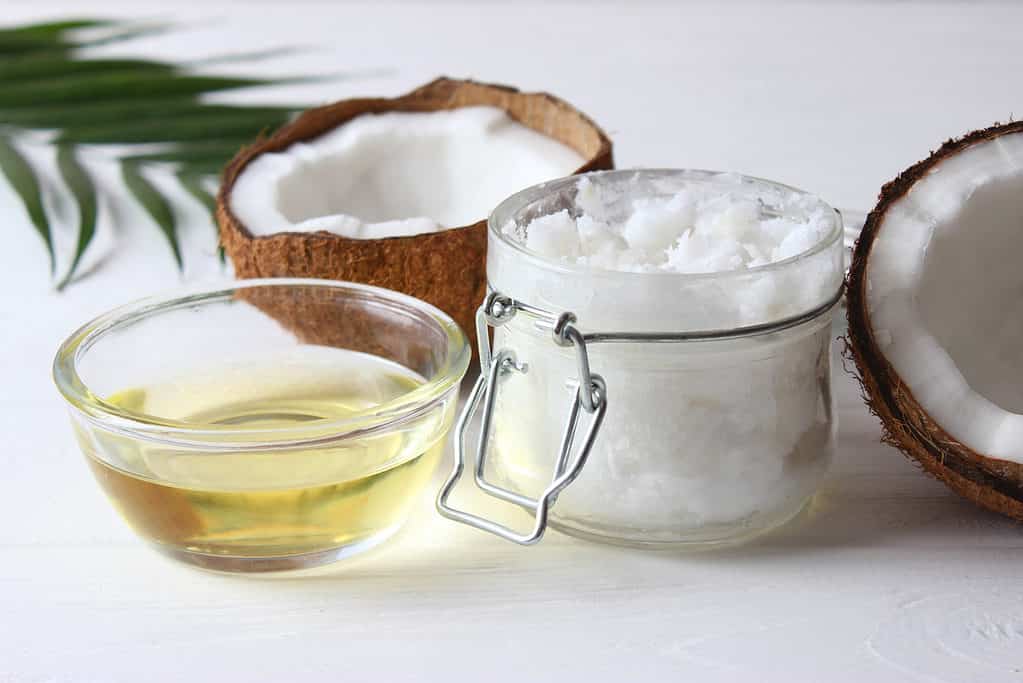Coconut oil is an edible oil derived from the coconut palm fruit. It has many uses, from moisturizing skin to a healthy alternative ingredient in cooking. But we mainly know coconut oil as being beneficial to humans, not necessarily animals. Are there safe uses for coconut oil in dogs? Should you use it as a supplement or a moisturizer? Discover the pros and cons of coconut oil, including how much you should give your dog.
Coconut Oil Benefits For Dogs

Coconut oil is an excellent moisturizer, perfect for dogs that suffer from itchy, dry skin. It will leave your dog’s skin and coat glossy and dandruff-free.
©iStock.com/white bear studio
Coconut oil has many benefits for both humans and dogs and acts as an anti-fungal and anti-inflammatory. And most vets agree that small amounts of coconut oil in dogs are safe and effective.
Coconut oil benefits for dogs:
- You can use it as an antibiotic ointment to help heal small wounds like cuts and scrapes. Due to its antifungal and antibacterial properties, it’s an excellent alternative to other over-the-counter products. However, be sure to speak with your vet first before using this to treat injuries. And significant wounds should always be treated by a medical facility.
- It can reduce inflammation (swelling) by improving antioxidant status.
- Coconut oil may help obese dogs lose weight by balancing the thyroid and decreasing fat deposits. Your dog may also see an increase in energy, leading to better stamina during exercise.
- Coconut oil is an excellent moisturizer, perfect for dogs that suffer from itchy, dry skin. It will leave your dog’s skin and coat glossy and dandruff-free. It also helps combat smells, which all pet owners can appreciate.
- Like humans, dogs can get coughs and sore throats. Coconut oil can help soothe an aching throat and relieve coughing.
- Studies show that coconut oil improves cognitive function in older dogs. Ketones provide your dog’s brain with energy, which can help prevent dementia.
- Put a small amount on your dog’s toothbrush and scrub away! Coconut oil has antimicrobial properties, making it a fantastic natural toothpaste. Plus, it makes your dog’s breath smell great!
- It repels fleas, ticks, and mites. Rub some on your dog’s coat before going outside.
- And finally, it can relieve allergic reactions to pollen.
The Cons of Coconut Oil in Dogs

Coconut oil contains over 90% saturated fat. This high-fat content feeds bacteria and causes inflammation in the gut, leading to a leaky gut.
©Dhanoo Surasarang/Shutterstock.com
While there are many benefits of using coconut oil, there are also some drawbacks that you may want to speak with your vet about.
- Coconut oil can upset your dog’s stomach, leading to loose stools or diarrhea. It can act as a natural stool softener, which can be good if that’s what your dog needs. But giving too much coconut oil can have unwanted effects.
- Researchers previously believed that coconut oil improved gut health, but new studies indicate that it may have the opposite effect. Coconut oil contains over 90% saturated fat. This high-fat content feeds bacteria and causes inflammation in the gut, leading to a leaky gut. A leaky gut occurs when the gut lining is damaged and can no longer function as a barrier, allowing bad bacteria and food particles to enter the body’s system and cause damage.
How Much Coconut Oil is OK For Dogs?

Small dogs can take between ⅛ and ¼ teaspoon per day, while larger dogs can handle between one teaspoon and one tablespoon.
©iStock.com/Vanessa Nunes
It is best to start slowly with small amounts of coconut oil. The dosage will depend on your dog’s size. Small dogs can take between ⅛ and ¼ teaspoon per day, while larger dogs can handle between one teaspoon and one tablespoon. Remember, giving your dog too much too fast can have negative effects, like upset stomach and diarrhea. Also, due to its high-fat content, you may want to get a professional opinion first.
How To Apply Coconut Oil to Dog Skin
Put a small amount of coconut oil on your hands, rub them together, and massage into your dog’s coat, getting the oil down to the skin’s surface. If using it as a moisturizer, massage the oil onto your dog’s skin and fur about once a week.
Where To Buy Coconut Oil For Dogs
You can find coconut oil for dogs on Amazon or most online pet stores. Check out this article for the best coconut oil recommendations, including prices and links to purchase.
*Note: This article does not attempt to give medical or veterinarian advice. Always speak with a professional before using coconut oil on your dog, or use it at your own discretion.
Up Next:
- The 4 Best Coconut Oils for Dogs: Reviewed
- Can Dogs Eat Olive Oil? What Are The Risks?
- Can Dogs Drink Coconut Water? Is It Safe or Dangerous?
The photo featured at the top of this post is © ThamKC/Shutterstock.com
Ready to discover the top 10 cutest dog breeds in the entire world?
How about the fastest dogs, the largest dogs and those that are -- quite frankly -- just the kindest dogs on the planet? Each day, AZ Animals sends out lists just like this to our thousands of email subscribers. And the best part? It's FREE. Join today by entering your email below.
Sources
- Web MD, Available here: https://pets.webmd.com/dogs/what-to-know-dogs-eat-coconut-oil
- iMedPub Journals, Available here: https://www.aclr.com.es/clinical-research/antibacterial-activity-of-lauric-acid-on-some-selected-clinical-isolates.pdf
- National Library of Medicine, Available here: https://pubmed.ncbi.nlm.nih.gov/11880549/
- National Library of Medicine, Available here: https://pubmed.ncbi.nlm.nih.gov/20141643/
- Oxford Academic, Available here: https://academic.oup.com/advances/article/11/1/77/5527771
Thank you for reading! Have some feedback for us? Contact the AZ Animals editorial team.






